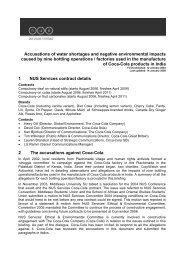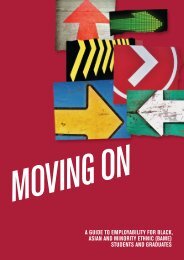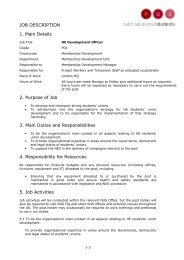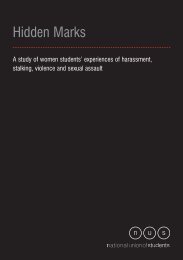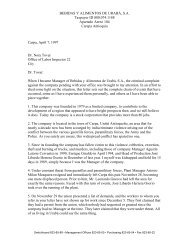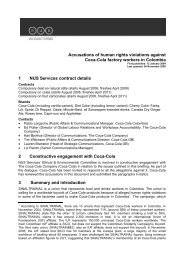No Place for Hate Crime - National Union of Students
No Place for Hate Crime - National Union of Students
No Place for Hate Crime - National Union of Students
Create successful ePaper yourself
Turn your PDF publications into a flip-book with our unique Google optimized e-Paper software.
The impact on victims<br />
Chart 13 Negative impact <strong>of</strong> victimisation<br />
Studies<br />
10<br />
9%<br />
7%<br />
Incidents motivated by<br />
prejudice against sexual<br />
orientation<br />
Physical health<br />
5%<br />
5%<br />
3%<br />
Incidents motivated by<br />
prejudice against gender<br />
identity<br />
Mental health<br />
12%<br />
20%<br />
25%<br />
<strong>No</strong>n bias incidents<br />
Financial well-being<br />
Job<br />
2%<br />
3%<br />
4%<br />
2%<br />
5%<br />
1%<br />
62%<br />
Acceptance <strong>of</strong> other social groups<br />
4%<br />
13%<br />
12%<br />
0% 5% 10% 15% 20% 25% 30%<br />
This is in line with a growing body <strong>of</strong> research on<br />
hate crime and its psychological consequences,<br />
which suggests that prejudiced victimisation leads<br />
to psychological distress and that hate crimes cause<br />
more negative outcomes than non-hate crimes. 28 It<br />
is clear from our data that the prejudice and hostility<br />
that motivates a hate incident substantially increases<br />
its severity, and even the most seemingly banal<br />
experiences can have a long-term effect on a victim. It<br />
is there<strong>for</strong>e vital that such prejudice is addressed and<br />
taken into account, both in supporting victims and in<br />
educating and disciplining <strong>of</strong>fenders.<br />
Effect on mental health<br />
In 25 per cent <strong>of</strong> incidents involving bias against the<br />
victim’s sexual orientation and 20 per cent <strong>of</strong> incidents<br />
prejudiced against their gender identity, the victim<br />
reported mental health problems – substantially<br />
higher than in non-bias incidents (12 per cent). When<br />
completing the survey, some respondents took the<br />
opportunity to write about their experiences and how<br />
they affected their mental health.<br />
“My depression, anxiety and isolation have been<br />
exacerbated [by this incident] and are proving to<br />
become an obstacle in all areas <strong>of</strong> my life, most<br />
worryingly my studies.”<br />
“I had to go into counselling. I suffered from<br />
nightmares, panic and anxiety attacks. I stopped<br />
speaking to new people. I had to see a psychiatrist<br />
and take antidepressants and panic and anxiety<br />
medications. I had to change my university course<br />
and defer a year to get away from the people abusing<br />
me.”<br />
“Sometimes I think about running away, or other<br />
serious thoughts.”<br />
“I feel that I can’t speak in public now. I feel that a lot<br />
<strong>of</strong> my confidence has been lost.”<br />
“I [find it] very hard to trust people and make new<br />
friends at the university campus.”<br />
“Sometimes I am violent to myself in private<br />
because how I have been treated by others makes<br />
me hate myself <strong>for</strong> being who I am, even though I<br />
know rationally it is stupid.”<br />
Emotional reactions such as anger, annoyance and<br />
shock were common among all victims. However, our<br />
data shows that victims <strong>of</strong> hate incidents manifested<br />
49



